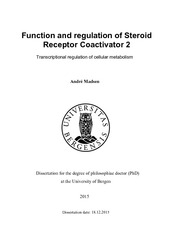| dc.contributor.author | Madsen, Andre | en_US |
| dc.date.accessioned | 2016-04-20T12:53:26Z | |
| dc.date.available | 2016-04-20T12:53:26Z | |
| dc.date.issued | 2015-12-18 | |
| dc.identifier.isbn | 978-82-308-3417-6 | en_US |
| dc.identifier.uri | https://hdl.handle.net/1956/11933 | |
| dc.description.abstract | Nuclear hormone receptors (NRs) associate with coregulators to enable complex programs of gene expression. The p160 steroid receptor coactivator 2 (SRC- 2/GRIP1) regulates metabolism and cellular processes in a tissue-specific manner by enhancing transcription of hormone regulated target genes. The transcriptional regulation and metabolic programming imposed by SRC-2 and its partner NRs has implications for several pathological processes. Although SRC-2 is known to facilitate lipogenesis and survival of prostate cancer cells, its role in breast cancer remains unclear. Hepatic ablation of SRC-2 impairs expression of key lipogenic and gluconeogenic enzymes, causing fasting hypoglycemia in mice. Previously, it has been shown that the cAMP/PKA pathway regulates the protein level of SRC-2. This thesis aimed to further investigate the functions of SRC-2 and characterize whether upstream regulation of SRC-2 affects its ability to promote expression of metabolic target genes. Paper I elucidates a mechanism by which cellular SRC-2 protein is subject to inhibitory upstream regulation by the cAMP/PKA pathway. Here, we showed that the cAMP response element-binding protein (CREB) has a key role in this mechanism by interacting with and stimulating proteasomal degradation of SRC-2. We demonstrated that the CREB basic leucine zipper (bZIP) domain and two functionally independent protein domains of SRC-2 (amino acids 347-758 and 1121-1462) are required to trigger degradation of SRC-2. Furthermore, overexpression of CREB inhibited the ability of SRC-2 to modulate expression of estrogen receptor alpha (ERα) target genes. These findings suggest that the previously established inhibitory effect of PKA on SRC-2 is executed via a direct interaction between CREB and SRC-2. Paper II reports that SRC-2 has a crucial function in regulating hepatocellular gluconeogenesis. Transcription of gluconeogenic enzymes including the rate-limiting glucose 6-phosphatase (G6Pase) is enabled by fasting hormone signaling via the cAMP/PKA pathway. Previously, it was demonstrated that SRC-2 liver knock-out mice exhibit fasting hypoglycemia due to reduced G6Pase expression. We validated that SRC-2 coactivates the RAR-related orphan receptor alpha (RORα) at the proximal G6Pase promoter in HepG2 cells. In line with the findings from the first paper, we observed that SRC-2 protein was subject to degradation in presence of the PKA catalytic subunit (PKA-Cα). Overexpression of PKA-Cα also reduced recruitment of SRC-2 and RNA polymerase II to the G6Pase promoter and rendered SRC-2 unable to coactivate RORα. Furthermore, we found that the presence of SRC- 2, via its association with RORα, is required for the transactivational effect of the master gluconeogenic regulator PPARG coactivator 1-alpha (PGC-1α) on the G6Pase promoter. These results suggest that PKA-mediated degradation of SRC-2 may represent an indirect feedback mechanism by which gluconeogenesis is suppressed throughout long-term starvation. Paper III elucidates a novel mechanism by which the anti-diabetic drug metformin reprograms hepatocellular metabolism via SRC-2. Tissue from SRC-2 liver knockout mouse model is characterized by impaired expression of lipogenic and gluconeogenic enzymes. Here, we showed that treatment of cells with metformin is accompanied by transcriptional repression of specifically SRC-2. Microarray analysis of FaO hepatoma cells treated with metformin revealed an overrepresentation of downregulated SRC-2 target genes involved in lipid and cholesterol biosynthesis. Promoter analyses confirmed that these genes were also transcriptional targets of the lipogenic sterol regulatory element (SRE) binding protein 1 (SREBP-1). Transactivation assays demonstrated that SRC-2 is a coactivator of SREBP-1, but not SREBP-2, on the fatty acid synthase (FASN) promoter. By repressing SRC-2 expression, metformin impeded recruitment of SRC-2 and RNA polymerase II to the G6Pc promoter and to SREs of SRC-2/SREBP-1 target gene promoters. Furthermore, metformin or knock-down of SRC-2 and SREBP-1 reduced hepatocellular fat accretion. Accordingly we propose that metformin transcriptionally suppresses hepatic gluconeogenesis and lipogenesis partly by inhibiting expression of SRC-2. | en_US |
| dc.language.iso | eng | eng |
| dc.publisher | The University of Bergen | eng |
| dc.relation.haspart | Paper I: Nuclear Hoang T, Fenne IS, Madsen A, Bozickovic O, Johannessen M, Bergsvåg M, Lien EA, Stallcup MR, Sagen JV, Moens U, and Mellgren G. cAMP Response Element-Binding Protein Interacts With and Stimulates the Proteasomal Degradation of the Nuclear Receptor Coactivator GRIP1. Endocrinology 2013, 154(4):1513–1527. The article is not available in BORA due to publisher restrictions. The published version is available at: <a href="http://dx.doi.org/10.1210/en.2012-2049" target="blank">http://dx.doi.org/10.1210/en.2012-2049</a> | en_US |
| dc.relation.haspart | Paper II: Madsen A, Bjune JI, Bjørkhaug L, Mellgren G and Sagen JV. The cAMP-dependent protein kinase downregulates glucose-6-phosphatase expression through RORα and SRC-2 coactivator transcriptional activity. Molecular and Cellular Endocrinology 2016, 419:92-101. The article is available in the main thesis. The article is also available at: <a href="http://dx.doi.org/10.1016/j.mce.2015.10.003" target="blank">http://dx.doi.org/10.1016/j.mce.2015.10.003</a> | en_US |
| dc.relation.haspart | Paper III: Madsen A, Bozickovic O, Bjune JI, Mellgren G and Sagen JV. Metformin inhibits hepatocellular glucose, lipid and cholesterol biosynthetic pathways by transcriptionally suppressing steroid receptor coactivator 2 (SRC-2). Scientific Reports 2015, 5:16430. The article is available at: <a href="http://hdl.handle.net/1956/11915" target="blank">http://hdl.handle.net/1956/11915</a> | en_US |
| dc.title | Function and regulation of Steroid Receptor Coactivator 2. Transcriptional regulation of cellular metabolism | en_US |
| dc.type | Doctoral thesis | |
| dc.rights.holder | Copyright the author. All rights reserved | |
| dc.identifier.cristin | 1303575 | |
